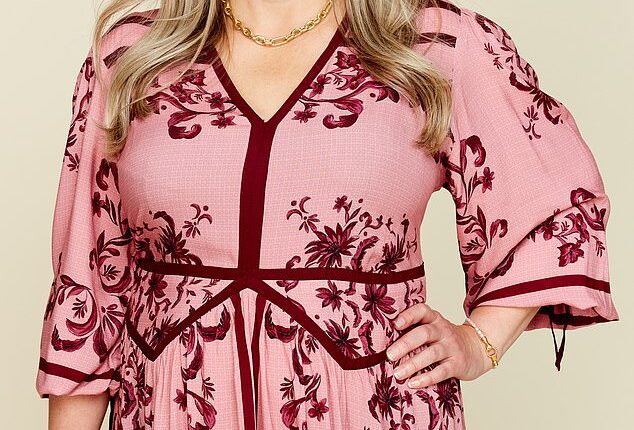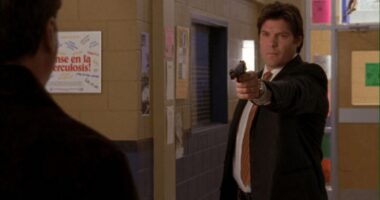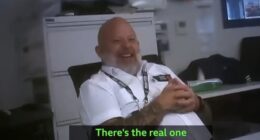I shall never forget the life-changing call from my sister-in-law to say my husband Chris was dead at just 51.
Despite always worrying this day would come, nothing could have prepared me for that devastating moment when alcohol dependency finally took the man who was – and will always be – my big love.
I remember walking into his bedroom after the paramedics had taken him away, a sea of empty bottles before me.
Filled with grief, anger and all-consuming guilt, I asked myself how I could have let this happen. Though the rational part of me knew then that love can’t save someone from addiction, it didn’t stop the ‘what ifs’.
What if I’d understood alcoholism more or Chris had gone to rehab years earlier? Would he be sitting here now?
Footballer Wayne Rooney’s admission last week that his wife Coleen saved him from his own drink demons has brought back all these emotions, even though I’ve long since healed from that traumatic day in 2017.
The truth is, only Chris could save Chris. After all, five stints in rehab where he received treatment from leading addiction experts hadn’t.
My heart goes out to all the Coleens who are caught in the downward spiral of fear, anticipatory grief and guilt – thinking they are responsible for their loved one’s recovery.

Kim Moore’s husband died in 2017 aged just 51
Chris and I met in 1997 while working for the same foreign exchange house – him in London, me at HQ in Canada – when I was 26 and he was 31.
When he flew over on business and I heard his voice and laughter behind me, I swung round, our eyes locked and my heart skipped a beat. It sounds like a romantic cliche, but it really was love at first sight.
That night, we had a pre-arranged dinner with my boss, which led to an evening of dancing. He was the wittiest, most charming man I’d ever met. The following day, I took him to Banff and, by the end of it, we knew it was love.
Back in London, over the next few months Chris sent letters, flowers, a mixed tape and the novel Breakfast At Tiffany’s with a handwritten message inside.
That October, he posted a surprise plane ticket to Heathrow for a two-week trip to see him over my birthday. During that idyllic trip, he proposed and we married in July 1999 in Witham, Essex. Life felt like a fairy tale.
But I started to notice that, outside the many social gatherings with friends, Chris would also drink while cooking or doing anything at home. It was his way of relaxing, but I could see he drank too much. There was a feeling of unease growing inside me, but I loved him, warts and all, as he used to joke.
On our wedding day, he drank from a hip flask and placed an arm around my waist at the altar. Our guests thought it was romantic, but I knew it was a means of steadying himself.
I started to find between two and four empty miniature spirit bottles at a time in his briefcases and pockets. I’d line them up on the kitchen counter so he knew that I knew. But neither of us ever discussed it. We were in denial and chose silence to deal with the problem.

Wayne Rooney and Coleen McLoughlin, then engaged, in 2007
When I voiced my concerns to his friends, they said he was fine. I thought, well if he loves me, he’ll stop. But anyone who’s lived with an addict knows it doesn’t work like that. Their addiction grips them.
One morning, I commented that his breath reeked of alcohol and he couldn’t go to work smelling like that. He said: ‘If you loved me, you wouldn’t say things like that.’
For a long time after that, I rarely spoke up. I started to lose myself in his illness. There were no cliched behaviours like the alcohol-soaked rage you might see on TV or in films, which partly fuelled my confusion.
Chris was always a gentle and loving man even when he was drinking – he considered himself a soppy drunk. As his drinking escalated, and as I felt the chaos of worry in my own head grow, I called Alcoholics Anonymous for advice, saying my husband was an alcoholic, only to be told: ‘That’s not for you to decide.’
I didn’t know where else to turn and questioned whether I was imagining it all.
Two years into our marriage I told my mother-in-law I was worried, but her response was: ‘All men drink, he works hard in the City.’
I then tried to speak to Chris about it, saying it was affecting me and our marriage – regardless of whether he felt he had a drink problem. He denied it. Yet he continued to down a Guinness while getting ready for work each day.
Life became even harder after we had our son in 2002 and our daughter in 2006. I was a young mum in my early 30s, far from home. We’d go to dinner parties and, while I sipped on water, Chris would drink glass after glass of wine. I’d watch him, anxiously willing him not to have another, and another. Chris could hold his drink, so nobody noticed.

Kim and Chris on their wedding day in 1997
The environment where he worked, as a risk analyst at a bank in the City, where people routinely coped with their high-pressure jobs by drinking vast quantities of booze, didn’t help. It was as though I was the only one that could see what was happening.
Eventually, I confronted him and said we couldn’t go on with our family life being so disrupted.
He finally acknowledged he had a problem and started going to AA meetings while I sought help from Al-Anon, which provides support for the families and friends of alcoholics. I felt there was hope, until a loved one told him: ‘You’re not an alcoholic, that’s too strong a word.’ Chris stopped going to AA. But I knew differently – he was an alcoholic.
On holidays, Chris would drink more. There were times I didn’t know if I’d be able to get him on the plane, and on one trip to Rimini in Italy, he fell over in the shower and hurt himself.
As the problem grew, he’d lock himself in a bedroom to drink so I – and later the kids, who are now 19 and 23 – didn’t have to witness his alcoholism. Luckily, they only saw him fall once.
One night in 2008 Chris didn’t come home from work, which was out of character. I couldn’t get hold of him and spent a terrifying, sleepless night worrying. I always feared getting a call to say he was dead.
The next morning, a London hospital rang to say Chris had been there, but discharged himself. When he finally came home, he had no recollection of any of it.
A few months later, he fell at home and couldn’t get up. I frantically called a friend who was a doctor. She calmly helped guide me to check his vitals, then I placed a blanket over him to keep him warm while he slept it off. The children didn’t see.

Wayne and Coleen in Los Angeles in 2012. Rooney admitted last week that his wife Coleen saved him from his drink demons
The morning after an episode, he was always quiet. He’d retreat into himself, suffering with extreme shame. Then one day, I snapped. I lined up all the empty bottles and cans – wine, Guinness, vodka – of which there were too many to count, from his weekend of drinking. I told Chris we couldn’t continue to live like that, he needed to go to rehab. He tearfully agreed.
For the next two years, he was in and out of treatment for a few weeks at a time. There were multiple trips to A&E, alcohol bottles hidden in every corner – even in the garden – and multiple stays in rehab.
When he came back from his first at The Priory, we sat and drank tea together and I really thought we were going to be fine.
But each time, things always returned to how they’d been.
On Christmas Eve 2009, I drove to visit him in his fourth rehab and thought, I can’t keep doing this, the kids can’t keep seeing me broken or their dad in this way.
It wasn’t long before I had to dial 999 again when Chris collapsed at home in early 2011. While paramedics dealt with him, I sat with my mother-in-law in the kitchen and told her: ‘You have to do what’s best for your son and for his recovery, but I have to do what’s best for my children to protect them and to give them a normal life, and the two things are not the same.’
Life was chaotic and distressing. Chris had been unable to work full-time from around 2009, and consequently we struggled to pay off debts.
He’d always relied on his annual bonus to cope but, after the 2007 financial crisis, they stopped. By the time I left him in 2011, he had credit card debts of around £50,000 and I had a cupboard full of unopened bills. Our finances were a mess.

Wayne and Coleen Rooney in August at BBC Sport’s 2025/26 Football Season Launch
I asked him to take responsibility for his debts and we agreed he could keep the house (I rented nearby with the kids) and live there as long as he could cover the bills.
To help him and to alleviate my guilt, I gave him my diamond engagement ring, our Audi and the Cartier watch he’d once bought me, in the hope he’d be able to sell them to get straight. I was frazzled, still working as a marketing strategist and trying to keep a roof over my and the children’s heads.
In 2012, we got divorced. For years, there was anger and pain, and only minimal contact with Chris. When he wasn’t well, he’d cancel having the kids. He was a loving father and didn’t want them to see him like that. But it did mean they were often disappointed and didn’t see him much.
In those later years of Chris’s illness, he was very tearful and in physical and emotional agony, fighting a losing battle for his life which tore us all apart.
My friends described it as watching a family in a car, slowly heading into a crash and not being able to do anything about it.
Then, in May 2017, I saw his number flash up on my phone and for reasons I still can’t explain, I decided to answer it. He said he wanted to hear my side of the story, how his illness had affected me, and urged me to share my experience to help myself and others.
He didn’t apologise, but he agreed we could both have dealt with his illness better. My heart was breaking knowing that better would never have been enough.
It was a conversation full of love and forgiveness. After the call, he sent me messages, asking to keep this healthy new way of communicating open.
A week later his heart stopped. He was dead. I’d known his death would come sooner, rather than later. He’d begun to shuffle like an old man and stopped caring about the perfectly ironed shirts and polished shoes he used to wear. He’d been hospitalised the previous autumn with an enlarged heart, but it was still a terrible shock when it happened.
It wasn’t until after his death friends admitted they knew there was a problem, even though for all those years they wouldn’t talk to me when I tried to get them to acknowledge his drinking.
Addiction thrives in secrecy and had stolen so much: our marriage, our dreams, my children’s father. The weeks, months and years that followed were filled with grief and anger – mine and my children’s.
Barely able to function, I struggled with memory issues, migraines and back pain. Years of hypervigilance and a nervous system stuck in high alert had taken its toll on me.
When you love an alcoholic, you hold on to the hope they’ll get better. Your own life becomes consumed with helping them to stop drinking but as the alcoholism progresses, there’s so much shame and guilt.
That’s why I feel for Coleen Rooney. I know how it feels to witness the despair and destruction, desperately hoping your love will be enough. I hope she reads this. My thoughts also go out to all the other Coleens out there: the mothers, fathers, partners, siblings, children, all of whom are helpless to save the person they love.
To all of them, I want to say – it is not your fault. Addiction is not yours to fix. You must take care of yourself. Rather like putting on your own oxygen mask first, it’s not selfish, it’s essential.
Two years after Chris’s death, a friend’s words gave me the push I needed to start practising self-compassion: ‘Kim, put your crown back on. Chris wouldn’t want you to live like this.’
I had to make a choice to learn to smile and be happy again.
In 2022 I founded Blossome, a community for people impacted by a loved one’s addiction – out of frustration from not being able to find anything that supported me. We don’t offer therapy or counselling; it’s about learning to be kind to yourself, while building connection and courage with others who understand.
I’m almost 55 now and I still love Chris. I always will. But I no longer bear the full weight of guilt. That last conversation we had before he died felt like he was giving me permission to speak and, eventually, to forgive myself.
Happiness for me now is spending time at my beach hut, travelling to Parkruns around Europe with friends and sharing stories about Chris in happier times with my children.
One standout memory was a rare family meal together in 2015 when Chris was in recovery. He’d brought the kids back home to me and stayed to cook dinner for us as I was running late.
I remember asking him: ‘How come your spaghetti is always better than mine?’ We laughed and it was as though the past had never happened. It was the first time both my kids were old enough to remember having a family dinner and a moment that was both precious and heartbreaking.
Their dad would be so proud of the resilient, compassionate young adults they’ve become.
Addiction is an illness beyond anyone’s control. Nothing I said, did, or didn’t do, could have cured it. Chris had to face it himself, and despite many attempts, the illness took his life.
I have also learned the painful way addiction is a family illness. We all got pulled into it, and we all needed to recover. But my children and I haven’t just survived, we are thriving. I only wish I could say the same for Chris.
- As told to Sadie Nicholas
- See blossome.support








